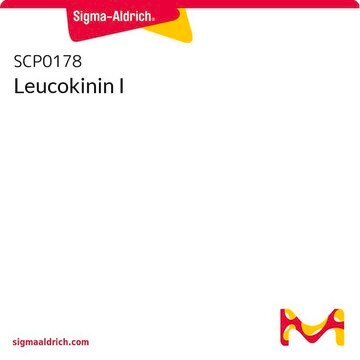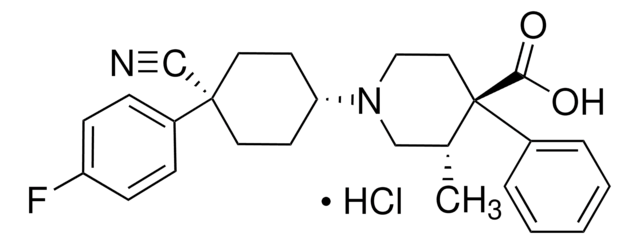SCP0182
[D-Phe2,D-Ala6]-LH-RH
Se connecterpour consulter vos tarifs contractuels et ceux de votre entreprise/organisme
About This Item
Formule empirique (notation de Hill):
C59H79N15O13
Poids moléculaire :
1206.35
Code UNSPSC :
12352209
Nomenclature NACRES :
NA.32
Produits recommandés
Pureté
≥95% (HPLC)
Forme
lyophilized
Composition
Peptide Content, ≥72%
Conditions de stockage
protect from light
Température de stockage
−20°C
Amino Acid Sequence
Glp-Phe-Trp-Ser-Tyr-Ala-Leu-Arg-Pro-Gly-NH2
Application
Luteinizing-hormone-releasing hormone (LHRH) (GnRH) is a decapeptide (pyroQHWSYKLRPG-NH2) trophic hormone that regulates the release of follicle-stimulating hormone (FSH) and luteinizing hormone (LH) from the anterior pituitary. Various analogues have been developed using D-amino acids to increase resistance to degradation. These analogues are used as potential targeting agents in the development of chemotherapies and as possible agonists and antagonist of the LHRH receptor.
Mention d'avertissement
Danger
Mentions de danger
Conseils de prudence
Classification des risques
Repr. 1B
Code de la classe de stockage
6.1C - Combustible acute toxic Cat.3 / toxic compounds or compounds which causing chronic effects
Classe de danger pour l'eau (WGK)
WGK 3
Point d'éclair (°F)
Not applicable
Point d'éclair (°C)
Not applicable
Certificats d'analyse (COA)
Recherchez un Certificats d'analyse (COA) en saisissant le numéro de lot du produit. Les numéros de lot figurent sur l'étiquette du produit après les mots "Lot" ou "Batch".
Déjà en possession de ce produit ?
Retrouvez la documentation relative aux produits que vous avez récemment achetés dans la Bibliothèque de documents.
G Emons et al.
European journal of cancer & clinical oncology, 25(2), 215-221 (1989-02-01)
As a first step to investigate whether gonadotropin releasing hormone (GnRH) analogs might be able to modulate directly the proliferation of human epithelial ovarian carcinomata, we checked if binding sites for GnRH are present in these malignancies. Specific binding of
Ana M Bajo et al.
Clinical cancer research : an official journal of the American Association for Cancer Research, 9(10 Pt 1), 3742-3748 (2003-09-25)
The receptors for luteinizing hormone-releasing hormone receptor (LHRH-R) are found in >50% of human breast cancers. Doxorubicin (DOX) was linked to [D-Lys(6)]LHRH to form a cytotoxic conjugate, AN-152, which can be targeted to tumor cells expressing LHRH-R. We evaluated the
Andreas R Günthert et al.
Breast cancer research and treatment, 87(3), 255-264 (2004-11-06)
More than 50% of human breast cancers express receptors for luteinizing hormone-releasing hormone (LHRH-R). These receptors can be used for targeted chemotherapy with agents like AN-152, in which doxorubicin is linked to analog [D-Lys6]LHRH. We compared the effects of AN-152
P J Wormald et al.
The Journal of clinical endocrinology and metabolism, 61(6), 1190-1194 (1985-12-01)
A specific, high affinity receptor for GnRH in human pituitaries obtained post mortem is described. The human pituitary GnRH receptor bound GnRH, a GnRH agonist [(D-Ala6,N alpha-MeLeu7,Pro9NEt)-GnRH], and a GnRH antagonist [Ac-D-Nal(2)1,D-alpha-Me-4-ClPhe2,D-3-Pal3,D-Arg6,D-Ala10 )-GnRH] with similar affinities (KdS of 4.81 nM
Alexandra P Kafka et al.
Biomedical chromatography : BMC, 24(2), 132-139 (2009-06-12)
A high-performance liquid chromatography (HPLC) method for assay of d-Lys(6)-GnRH contained in a microemulsion-type formulation is described. The peptide is extracted from the microemulsion matrix and quantified using a two-step gradient method. Separation from microemulsion compounds and potential peptide oxidation
Notre équipe de scientifiques dispose d'une expérience dans tous les secteurs de la recherche, notamment en sciences de la vie, science des matériaux, synthèse chimique, chromatographie, analyse et dans de nombreux autres domaines..
Contacter notre Service technique






